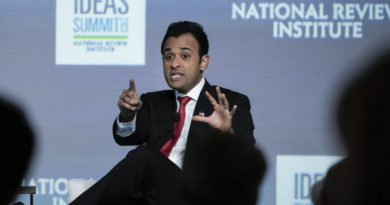‘Bringing some of the investor protections to it’: How EDX Markets is embracing TradFi to become the safest bet in crypto
Jamil Nazarali knows what he wants to do at EDX Markets—and what he wants to avoid.
The new crypto exchange, backed by established players in traditional finance like Citadel Securities, Fidelity, and Charles Schwab, is poised to fill a void largely created when FTX blew up and which may expand depending on legal rulings for Binance and Coinbase.
“We deliberately built our business model in a way that avoids some of the problems that the other exchanges are facing right now,” Nazarali, CEO of EDX, told Fortune.
For EDX, this means embracing innovations of the crypto space but also clinging to some of the best practices seen in traditional finance. At the new exchange, launched Tuesday, customers can still trade four cryptocurrencies nearly 24/7, but the exchange will separate the broker, the dealer, and the exchange functions of trading, Nazarali said. And it will not hold retail clients’ money.
Many potential crypto investors are still curious about the space but wary of its volatility. By taking inspiration from TradFi, EDX wants to attract these risk-averse customers, including deep-pocketed investors and institutions that have been turned off by the recent instability in the sector and the regulatory uncertainty. It already counts Citadel, one of its backers, as a customer, Nazarali said.
Instead of retail investors directly trading crypto through the EDX platform, like they would on other exchanges, individual investors will interact with intermediaries, an approach akin to, say, trading stocks on the New York Stock Exchange. EDX is planning to launch its own clearinghouse by the end of the year. Overall, it’s a model that limits risk, Nazarali explained.
“There’s going to be no one that trades through a trusted intermediary that lost their keys to $200 million of crypto—and is looking in a garbage dump for years,” he said.
The marketplace will also give customers access to better prices on trades via a “retail-only quote,” Nazarali explained. Because institutional traders often buy in large quantities, they can cause market makers to lose money on trades that push up asset prices. Firms can charge more to account for this, but retail traders can get caught up in this interaction, which increases the price they have to pay for assets despite trading in much smaller quantities. By sequestering retail trading activity, EDX can offer customers better prices on smaller trades.
The strategy of combining aspects of both crypto and traditional finance could make companies like EDX more competitive, Brett Harrison, the founder and CEO of Architect and former president of FTX US, said Tuesday on Bloomberg Crypto.
“I think you’re going to see those kinds of models appear as well, to compete with the more traditional models, the way that EDX or a traditional exchange like Nasdaq or CME might,” Harrison said.
The marketplace’s launch also bodes well for crypto as a whole, Genesis’ managing director of sales and trading Gordon Grant told Fortune. Along with BlackRock’s application to create a Bitcoin ETF last week, the support of established players behind EDX shows that cryptocurrencies are still being taken seriously by some of the world’s largest firms.
“It’s a sign that they believe that there’s real economic activity taking place within this asset class that needs to be served, and is perhaps not being served at all—or as well as it should be,” Grant said.
Heading into the second half of 2023, the participation of major players in crypto and larger investments in the space could push up crypto prices, said Josh Barkhordar, the global head of sales at Genesis.
“We’re seeing all of this momentum continuing to build in the face of adversity despite all of the obstacles that we’ve seen over the last six months,” Barkhordar said. “Now, it feels like those obstacles are starting to subside.”
While some crypto companies have been weighed down by the increased regulatory scrutiny in the U.S., Nazarali said he sees no disadvantages in EDX playing it safe.
“We’re retaining a lot of the innovative characteristics of the digital market but bringing some of the investor protections to it,” he said. “We think that that’s all a really good thing.”


